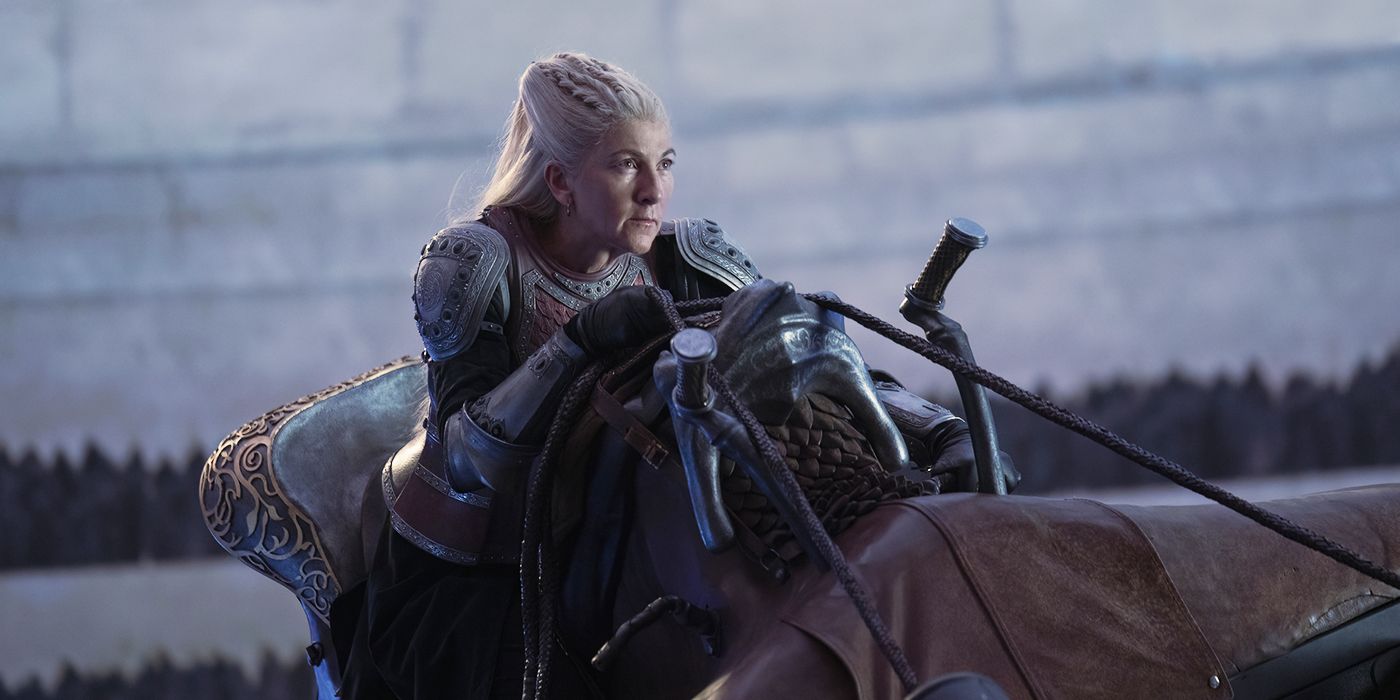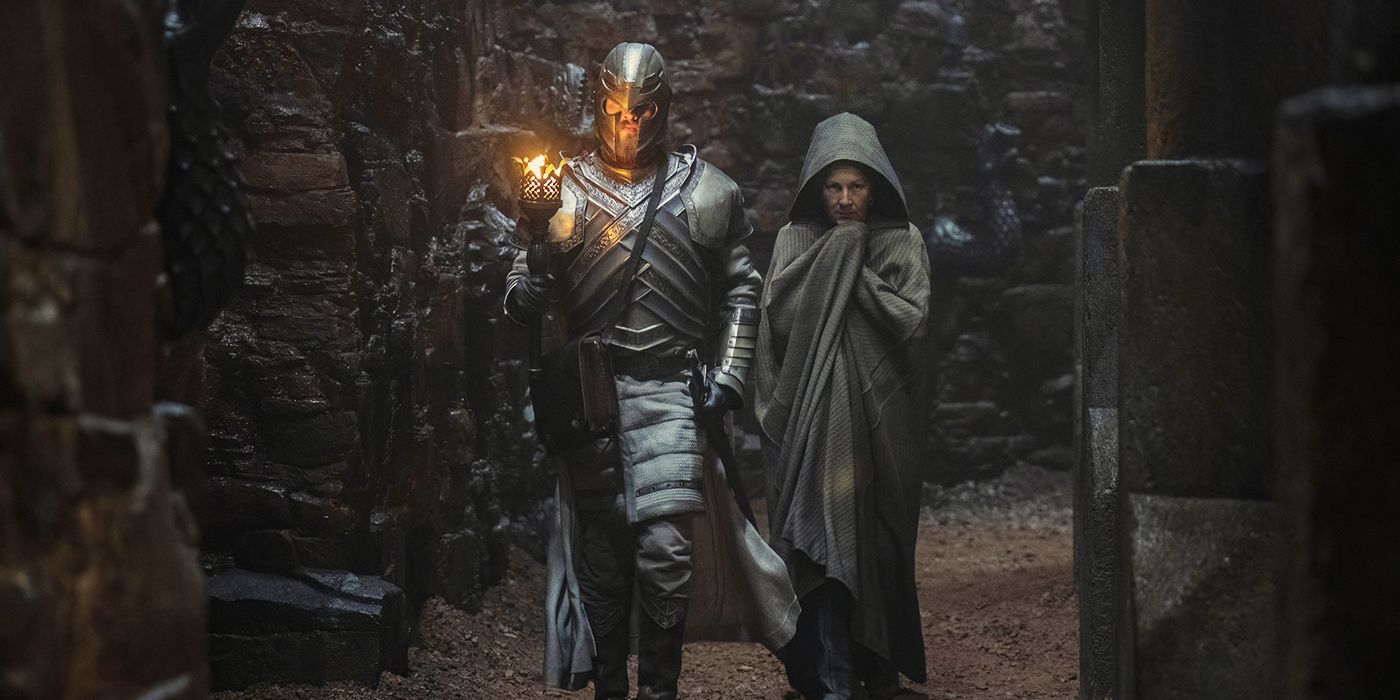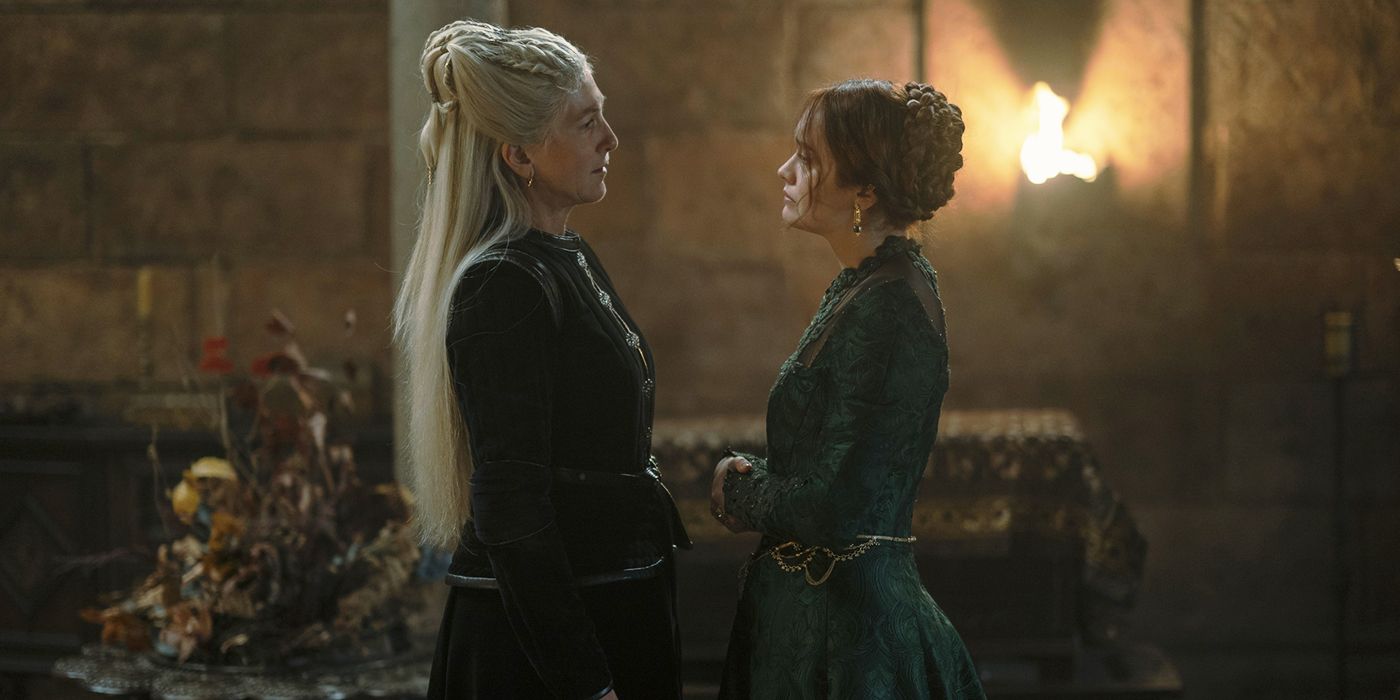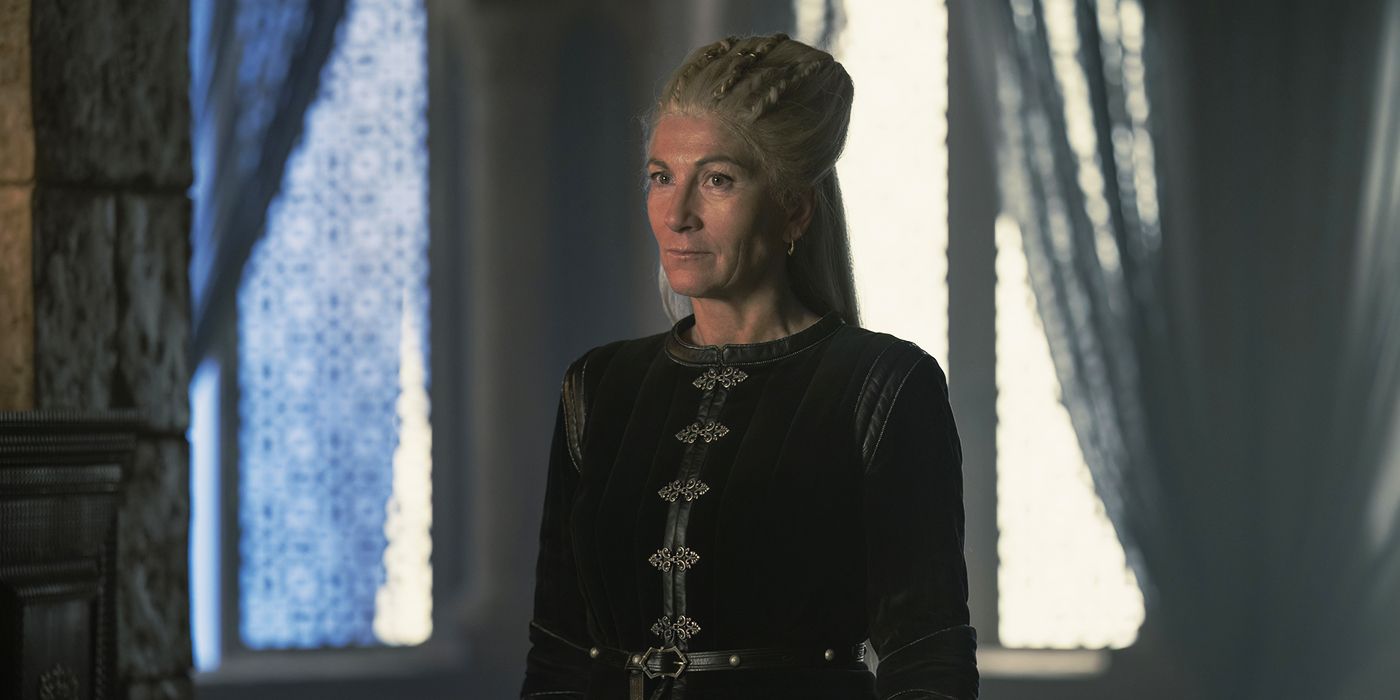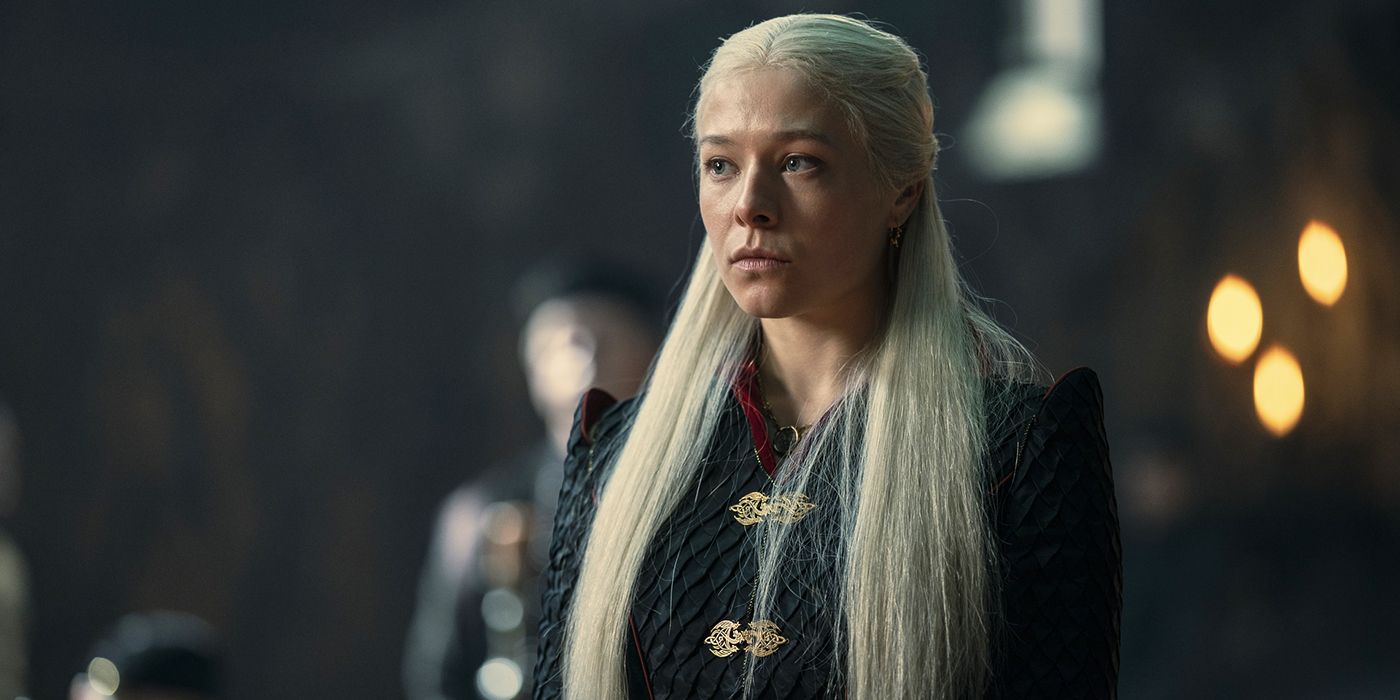Editor's Note: The following contains spoilers for Episodes 1-9 of House of the Dragon.Episode 9 of House of the Dragon had plenty of excitement taking place, but no event may have been more substantial than Aegon II Targaryen's (Tom Glynn-Carney) coronation. During the ceremony in the Dragon Pit, after being anointed by the Faith of the Seven, disaster strikes for the young king and his supporters. Rhaenys (Eve Best) escapes her confinement in the Red Keep thanks to the exploits of Kingsguard knight Ser Erryk Cargyll (Elliott Tittensor), making her way to the bowels of the Dragon Pit's dungeons to retrieve her dragon Meleys, the Red Queen. Meleys and Rhaenys erupt from the floor of the pit, flattening commoners and sending them scrambling for safety.
As Aegon, his family, and supporters look on from the dais, Meleys lets out a terrifying roar before flying through the Dragon Pit's gates and departing King's Landing. This event was certainly thrilling, but it also likely had more than a few fans and watchers confused. Rhaenys had made her support for Rhaenyra Targaryen (Emma D'Arcy) and her claim to the Iron Throne clear, and the supporters of Aegon (the Greens) had confined her to keep her from opposing his ascent as king after the death of her cousin, King Viserys (Paddy Considine). Given all that's transpired, why didn't Rhaenys have Meleys burn the Greens alive before she left? In the minds of many, this certainly would have solved any issues with the line of succession, leaving Rhaenyra as the clear-cut heir to the Seven Kingdoms of Westeros.
Why Didn't Rhaenys Kill Aegon and the Greens?
In Episode 9's "Inside the Episode," watchers received once answer as to why the Lady of Driftmark didn't go through with roasting her adversaries. Showrunners Miguel Sapochnik and Ryan Condal remarked that while Rhaenys' scene in the Dragon Pit should certainly send a message, The Queen Who Never Was still has her morals to take into account. Condal stated that as a mother herself, Rhaenys likely couldn't see herself taking the life of Alicent Hightower (Olivia Cooke) along with her children. While the likes of Otto Hightower (Rhys Ifans) or Ser Criston Cole (Fabien Frankel) likely wouldn't have bothered her much, the thought of murdering Alicent and her children by Viserys likely stayed her hand as she herself is a mother and could likely imagine the grief caused. Instead, Rhaenys sends a message in a heroic moment by intimidating the Greens before departing to Dragonstone to inform Rhaenyra of the coup taking place.
It's certainly a decision that many fans and watchers have disputed since Episode 9's airing, but it may be necessary to dig a bit deeper into Rhaenys' character to determine why she made the decision she did in this iconic moment. Sapochnik and Condal have provided the face-value assessment, but if we examine what has transpired for Rhaenys over the course of Season 1, her refusal to kill the Greens appears much more justified. Of course, some fans will still have wished Meleys cooked the Greens to completion in Dragonfire, but perhaps they can at least understand Rhaenys' reasoning at the end of the day.
Analyzing Why Rhaenys Made Her Choice
While Rhaenys Velaryon is undoubtedly a wife and mother, which factored into her decision considerably, there are many more factors at play. One needs only to look back at previous episodes and the events that have unfolded to see why the Lady of Driftmark might pull back from outright torching her opposition. Family is a huge motivation in this scene in particular. While it's true that the Hightowers have made a move against Rhaenyra, it's important to remember that Alicent is still the wife of the late King Viserys, and all of her children, flaws and all, are still Viserys' children as well.
Even as his sickness began to take him, Viserys was adamant about the cohesion of family and did not wish under any circumstance for his kin to be harmed. It's why we see the king banish his brother Daemon Targaryen (Matt Smith) time and time again for his scandalous actions as opposed to having him executed on the spot. Even after Daemon outright murders Vaemond Velaryon (Wil Johnson) in the throne room of the Red Keep, Viserys resists the most bloodthirsty of reprisals. If the king was this gracious towards his reckless and disrespectful brother, it goes without saying that he wouldn't want a hair on his children or cousins harmed either. Not every Targaryen monarch shared this quality, but Viserys' passion and love for his family is a huge influence on Rhaenys' decision. With the king gone, who is Rhaenys to take the lives of his wife and children? Even if they're going against his wishes that Rhaenyra would rule in his stead.
By this time in the season, Rhaenys is already well-acquainted with the concept of loss. Her daughter Laena (Nanna Blondell) has already perished by Dragonfire during a problematic childbirth. Her son Laenor (John Macmillan) is presumed dead by Rhaenyra and Daemon's subterfuge, and her husband Corlys (Steve Toussaint) has been gravely wounded in the Stepstones and may not survive to see Driftmark ever again. Simply put, Rhaenys is familiar with family tragedy, and likely doesn't wish to inflict that on others, especially not those within her own extended family. The grief and damage caused to the last two High Valyrian houses is simply too great a wound to inflict.
There's Historical Reasoning Behind Rhaenys' Mercy
There's a political angle to consider as well. Westeros and its alliances between the Great Houses are constantly shifting. Had news that Rhaenys had burned the inhabitants of the Dragon Pit alive during Aegon's coronation, many of the banners that had previously supported Rhaenyra's faction (the Blacks) may have withdrawn their support. Acts of barbarism by previous kings such as Maegor I Targaryen are a constant reminder that violent acts have consequences. In Maegor's situation, he had the mighty Balerion the Black Dread as his dragon, which likely cowed many houses into complying with the vicious monarch's actions. However, some Lords Paramount in Westeros still staunchly opposed his actions, with some declaring support for Prince Aenys I Targaryen as a reprisal. Those brave enough to stand against Maegor were spared much of his rage when he was unexpectedly found dead upon the Iron Throne, but the lessons of Maegor the Cruel's rule were instilled in future generations of Targaryens to not let rage and violence overtake their decisions.
In Westerosi tradition, Kinslaying is also a particularly problematic taboo. Though the history of the Seven Kingdoms is fraught with it regardless, taking the life of a family member is a grave offense in the eyes of both the nobility and the smallfolk. Suppose Rhaenys killed the Greens in totality, including members of her own family, and the Blacks arrive at King's Landing to crown Rhaenyra. There's no guarantee that there wouldn't be massive upheaval from the city's populace or the Faith of the Seven itself, who hold considerable sway throughout the realm. The Blacks may be victorious, but holding Westeros together would become exponentially more difficult due to the exploits that caused that victory. The ancient and powerful House Hightower in particular would likely carry a blood feud towards the Targaryens that would last generations, and they could garner that anger into support from throughout the Seven Kingdoms to unseat Rhaenyra at the very least.
Killing the Greens Would Have Denied Rhaenyra's Choice
The final point of note is undoubtedly that of Rhaenyra Targaryen. Having grown up with Alicent Hightower, the princess still harbors some appreciation for the Queen Dowager. Though they had a substantial amount of bad blood transpiring over the season's course, a tenuous personal peace was made between the two during Viserys' final moments in Episode 8. Alternatively, Alicent goes out of her way to retrieve Aegon before his coronation, resolving to handle the succession in a diplomatic way with the Blacks. This caused substantial umbrage from Otto, who instead intended to eliminate the Blacks root-and-stem to keep Aegon's status as king secure through any means necessary. Knowing that Rhaenys had not only killed Alicent, but also her children, may have evoked a less-than-savory reaction from Rhaenyra herself. While we can't know for certain, that possibility likely crossed Rhaenys' mind at least once.
For better or worse, the figureheads of the Greens and Blacks are Aegon and Rhaenyra respectively. They hold near-absolute power over the decision-making for their respective factions. Rhaenys undertaking such a reckless action would remove any semblance of choice for Rhaenyra. She may have become queen, but if it came at the cost of the death of her childhood friend and her own siblings, the cost may be considered too high.
Of course, we all know by now that the Dance of the Dragons has begun. Rhaenys' departure to Dragonstone has all but sealed that fate. Rhaenys' decision likely could have made Rhaenyra's ascent as queen easier, but there's no guarantee the realm wouldn't have bled as a result. Perhaps not in the way the Dance will ravage the Seven Kingdoms and House Targaryen, but the results could have been just as traumatic. Nonetheless, some might say that the coming war was unavoidable, no matter the choices that Rhaenys made in that singular moment in the Dragon Pit. King Jaehaerys (Michael Carter) even alluded to this in Episode 1 with his decision to call the Great Council of 101 AC to name his heir and avoid a war of succession. As Rhaenyra remarked clearly in the opening monologue, The Old King knew "the only thing that could tear down the House of the Dragon was itself."

